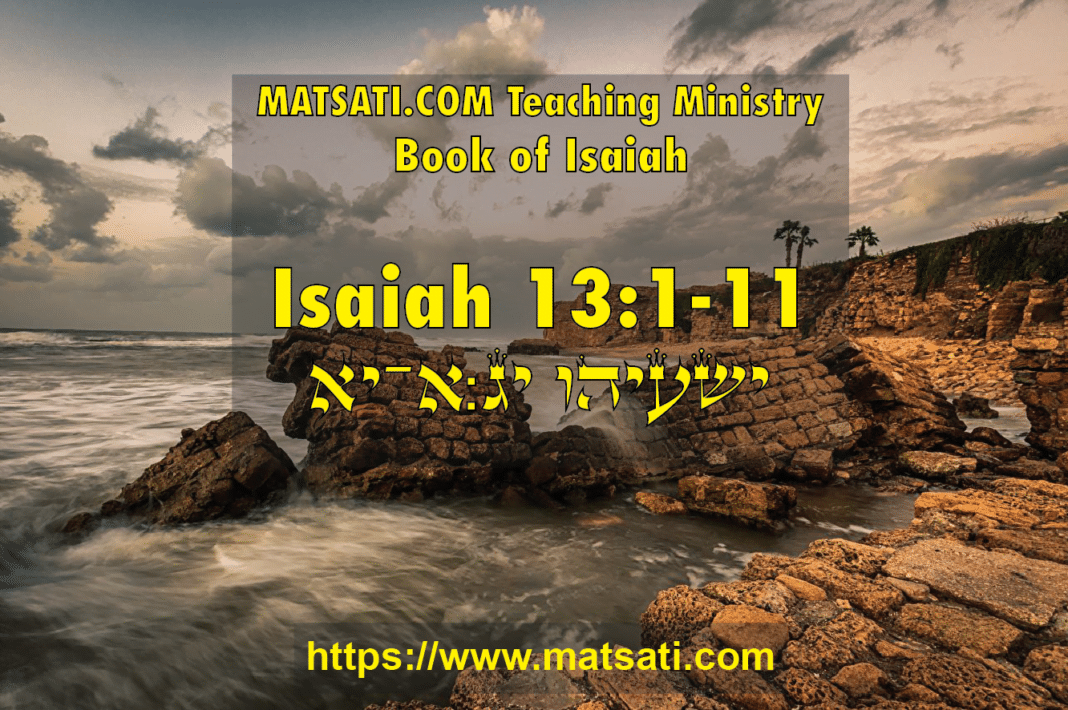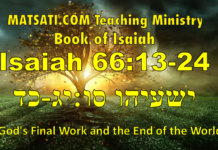Introduction to Isaiah 13:1-11
The Christian commentaries have a major problem with the shift in narrative as we get into chapter 13 and Isaiah starts talking about Babylon. The reason being the relationship between these chapters is not clear in addition to Babylon only becoming a conquering nation 100 years after Isaiah. This difficulty is rooted in a lack of faith, not believing that God can provide a prophetic word of the destruction of nations prior to this happening. Many commentaries simply state that these chapters were put together by different redactors and could not have been written by Isaiah. As we continue through chapters 13-39, Isaiah does however maintain the theme he has established in Isaiah 1-7, that is to trust in God and not in man. Note again that trusting in the Lord God in heaven leads to life, whereas trusting in man leads to destruction. John Oswalt states that “the God of Israel is the Lord of the nations and the fate of the nations is in his hands (Isaiah 13–23); he is the sovereign actor on the stage of history, not they (Isaiah 24–27); trusting the nations instead of the King is foolishness (Isaiah 28–33); the ultimate conclusion is if one trusts in the nation’s this leads to a desert waste, whereas trusting in God leads to גן עדן the garden of Eden / Paradise (Isaiah 34, 35).” His point is that this theme ties these chapters 13-39 together in a well-structured way. There are four major sections in Isaiah 13-14 where 13:1–18 describes God’s Destruction of Human Pride; 13:19–22 describes the destruction of Babylon; 14:1–23 describes the downfall of the King of Babylon; and 14:24–27 describes the Lord’s Plan for Assyria.
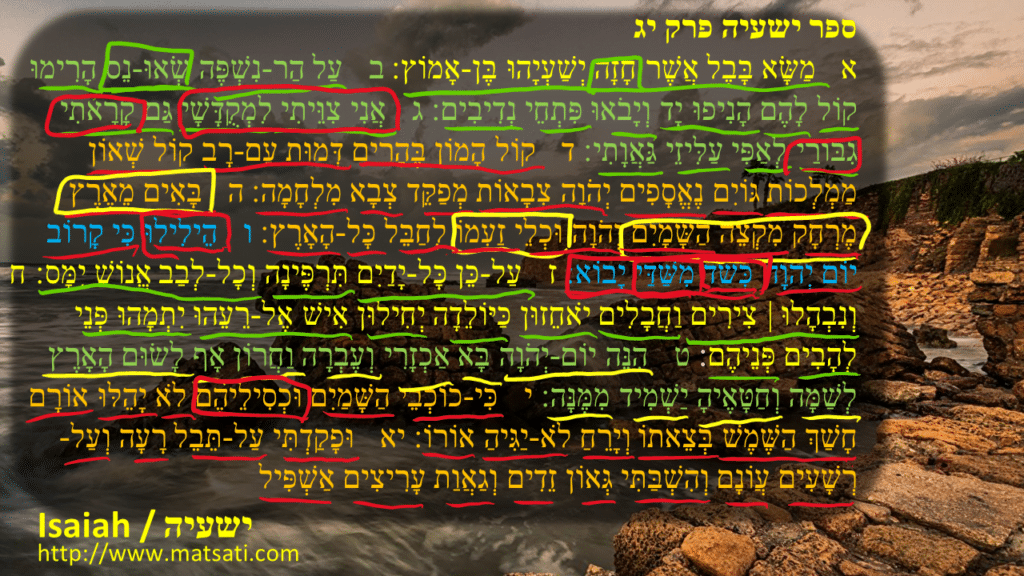
Isaiah opens chapter 13 saying the following.
ספר ישעיה פרק יג
א מַשָּׂא בָּבֶל אֲשֶׁר חָזָה יְשַׁעְיָהוּ בֶּן-אָמוֹץ:
Isaiah 13:1 states, “The burden of Babylon, which Isaiah the son of Amoz did see. (מַשָּׂא בָּבֶל אֲשֶׁר חָזָה יְשַׁעְיָהוּ בֶּן-אָמוֹץ)” This statement provides for us the context that God is able to show his prophet the things which are to come. The Lord God is able to reveal events before they come to pass (see Isaiah 14:24-27, 41:21-27, 44:7-8, 45:20-21). Something to consider in regards to those who lack faith in God’s ability to provide the course of future events. The idea is that throughout the Bible, we learn about who God is, He is a moral God who speaks truth. This means that when we read the Scriptures, we can believe them because they speak truth, they are an accurate record of history and of God working in the lives of His people, and we can believe and have faith that when we seek Him and His Messiah Yeshua, we can have the God of Israel working in our lives too, in the very same way that we see taking place in the Scriptures. In verse 13:1, Isaiah speaks of the truth of what is going to happen to Babylon. If we are to believe that these words were manipulated, meaning that there is a falsehood that is being used to prove a truth, (note the commentaries that don’t believe God can speak prophetically) this is patently contradictory to the character and truthfulness of God and the Scriptures. Considering also the scribal tradition, the meticulous methods in which the scriptures were preserved, the men involved in preserving the scriptures were not about the business of inserting their interpretation of what Isaiah was saying (i.e. modifying the text). Take for example the Qere and Ketiv, from the Aramaic qere, קְרֵי (“what is read”) and ketiv, כְּתִיב (“what is written”), are orthographic devices that were used by the Masoretes, i.e., Jewish scribes from the 6-10 th centuries. In these locations, the text is written in one way, yet the text is to be read a different way, the notes are made in the marginal massorah. The point is that the scribes were so meticulous in preserving the original writing of the text, that even if there were errors in the text in how it was to be read, they preserved these errors and simply made a note at the bottom of the page. The significance of this is related to the truth claim, that the Scriptures are not leading us to believe a falsehood. If the text was modified to use a falsehood to prove a truth, this stands in the face of everything that God and His word represents and poses a very serious problem! In addition, Isaiah did not necessarily have to have a complete picture given by God of Nebuchadrezzar and all of the events that take place, but simply needed a generalized understanding that in their pride they would fall as well, similar to the way that Assyria is behaving. Some commentators however force their opinion into the book of Isaiah believing that Isaiah needed to have all of the details in order to be proven as a true prophet of God. Predictive prophecy does not necessarily have to contain “all” of the explicit details, and this is what we see in Isaiah’s prophetic words as we continue to study this book.
ספר ישעיה פרק יג
ב עַל הַר-נִשְׁפֶּה שְֹאוּ-נֵס הָרִימוּ קוֹל לָהֶם הָנִיפוּ יָד וְיָבֹאוּ פִּתְחֵי נְדִיבִים: ג אֲנִי צִוֵּיתִי לִמְקֻדָּשָׁי גַּם קָרָאתִי גִבּוֹרַי לְאַפִּי עַלִּיזֵי גַּאֲוָתִי:
Isaiah 13:2 states, “Lift ye up a banner upon the high mountain, (עַל הַר-נִשְׁפֶּה שְֹאוּ-נֵס) exalt the voice unto them, shake the hand, (הָרִימוּ קוֹל לָהֶם הָנִיפוּ יָד) that they may go into the gates of the nobles. (וְיָבֹאוּ פִּתְחֵי נְדִיבִים)” Isaiah 13:3 “I have commanded my sanctified ones, (אֲנִי צִוֵּיתִי לִמְקֻדָּשָׁי) I have also called my mighty ones for mine anger, even them that rejoice in my highness. (גַּם קָרָאתִי גִבּוֹרַי לְאַפִּי עַלִּיזֵי גַּאֲוָתִי)” This reminds us of the Torah perspective from Parashat Beshalach (Shemot / Exodus 13:17-17:16) and how Moshe’s body grew tired, and his arms began to fall and when his arms fell Israel started to lose the battle. Only with Moshe’s arms raised did Israel win the battle. We read that Aaron and Hur stood on either side and held up his hands until the battle was won. As a result of this victory Moses built an altar and called it “Adonai Nissi,” which means the Lord is my banner. Here the Lord God is calling out to the nation of Babylon to raise up the banner (Isaiah 5:26, 11:10-12, 18:3, 49:22, and 66:10), which is a call to arms from a Torah perspective. The point is that God is going to use the proud to cast down the proud (see Mishley / Proverbs 3:34, James 4:6, and 1 Peter 5:5). The statement אֲנִי צִוֵּיתִי לִמְקֻדָּשָׁי “I have commanded my holy/sanctified ones” seems strange as this may refer to the men who are making ready for battle do so via purification, keeping themselves pure and holy unto God, note 1 Samuel 21:5-6 what David and his men do. The root (שורש) meaning קדוש means to be set apart. So this may be speaking of how God is calling this nation and single this nation out as setting her apart to bring judgment against Judah and Jerusalem. (see Isaiah 10:6-7, 45:4-6, Jeremiah 22:7, Joel 2:2 and 2:11). It is interesting how the Lord speaks of Babylon, גַּם קָרָאתִי גִבּוֹרַי לְאַפִּי עַלִּיזֵי גַּאֲוָתִי “I have also called my mighty ones for mine anger, even them that rejoice in my highness.” The conclusion may be related to the words that were spoken to the men of Jerusalem when they were surrounded, that the God of Israel had sent them, essentially giving God praise through the greatness of His calling on their army to conquer the city. (See book of Jeremiah)
ספר ישעיה פרק יג
ד קוֹל הָמוֹן בֶּהָרִים דְּמוּת עַם-רָב קוֹל שְׁאוֹן מַמְלְכוֹת גּוֹיִם נֶאֱסָפִים יְהֹוָה צְבָאוֹת מְפַקֵּד צְבָא מִלְחָמָה: ה בָּאִים מֵאֶרֶץ מֶרְחָק מִקְצֵה הַשָּׁמָיִם יְהֹוָה וּכְלֵי זַעְמוֹ לְחַבֵּל כָּל-הָאָרֶץ:
Isaiah 13:4 states, “The noise of a multitude in the mountains, (קוֹל הָמוֹן בֶּהָרִים) like as of a great people; (דְּמוּת עַם-רָב) a tumultuous noise of the kingdoms of nations gathered together: (קוֹל שְׁאוֹן מַמְלְכוֹת גּוֹיִם נֶאֱסָפִים) the LORD of hosts mustered the host of the battle. (יְהֹוָה צְבָאוֹת מְפַקֵּד צְבָא מִלְחָמָה)” Isaiah 13:5 “They come from a far country, from the end of heaven, (בָּאִים מֵאֶרֶץ מֶרְחָק מִקְצֵה הַשָּׁמָיִם) even the LORD, and the weapons of his indignation, to destroy the whole land. (יְהֹוָה וּכְלֵי זַעְמוֹ לְחַבֵּל כָּל-הָאָרֶץ)’‘ Isaiah describes the people saying קוֹל הָמוֹן בֶּהָרִים דְּמוּת עַם-רָב קוֹל שְׁאוֹן מַמְלְכוֹת גּוֹיִם נֶאֱסָפִים יְהֹוָה צְבָאוֹת מְפַקֵּד צְבָא מִלְחָמָה “The noise of a multitude in the mountains, like as of a great people; a tumultuous noise of the kingdoms of nations gathered together: the LORD of hosts summoned / mobilized the host of the battle.” This directly speaks to the Lord God gathering the nation and bringing them to Judah and Jerusalem. We note according to Isaiah 13:5 that it does not matter the distance the nation is from Israel, that the Lord can call a nation from anywhere on the surface of the earth. This great army that is being described here has come for one purpose, the destruction of Judah and Jerusalem because of her unrepentant sin. Note the emphasis in these verses is upon the army that God is putting together to destroy the whole land (וּכְלֵי זַעְמוֹ לְחַבֵּל כָּל-הָאָרֶץ). Note this word וּכְלֵי זַעְמוֹ “vessels of wrath” does this remind us of what Paul writes according to Romans 9:22
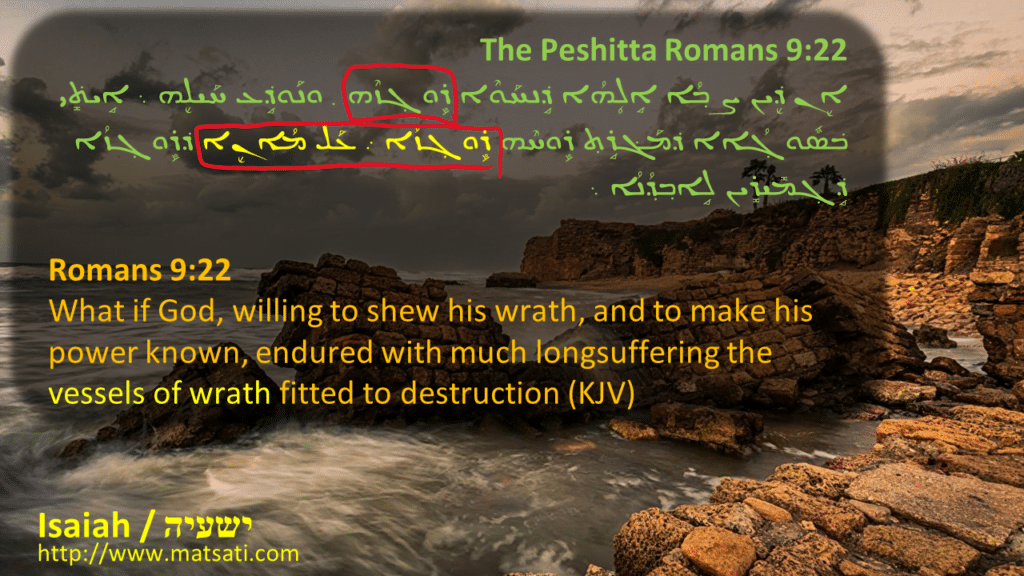
The Peshitta Romans 9:22
ܐܷܢ ܕܷ݁ܝܢ ܨܒ݂ܳܐ ܐܱܠܴܗܳܐ ܕܱ݁ܢܚܰܘܶܐ ܪܾܘܓ݂ܙܶܗ ܂ ܘܢܰܘܕܱ݁ܥ ܚܰܝܠܷܗ ܆ ܐܱܝܬܻ݁ܝ ܒ݁ܣܽܘܓ݂ܳܐܐ ܕ݁ܡܰܓ݁ܪܱܬ݂ ܪܾܘܚܶܗ ܪܾܘܓ݂ܙܳܐ ܇ ܥܰܠ ܡܳܐܢܷ̈ܐ ܕ݁ܪܾܘܓ݂ܙܳܐ ܕܱ݁ܓ݂ܡܺܝܪܻܝܢ ܠܱܐܒ݂ܕ݂ܳܢܳܐ ܆
Romans 9:22
What if God, willing to shew his wrath, and to make his power known, endured with much longsuffering the vessels of wrath fitted to destruction (KJV)
Here the Peshitta states ܪܾܘܓ݂ܙܳܐ܇ ܥܰܠ ܡܳܐܢܷ̈ܐ “wrath upon vessels” that God can create men for destruction and bring them from the farthest regions of the earth to be His instruments to bring the destruction that is promised according to the Torah for those who refuse to seek the Lord and listen to His voice and calling. So, in this context from Isaiah, the Lord is coming along with His army, His vessels of wrath, to demonstrate that we need to have faith in Him, in the Lord God in heaven, and not in this world or its pleasures and wealth. How foolish it is to trust in this world as opposed to the Lord God Almighty in heaven!
ספר ישעיה פרק יג
ו הֵילִילוּ כִּי קָרוֹב יוֹם יְהֹוָה כְּשֹׁד מִשַּׁדַּי יָבוֹא:
Isaiah 13:6 states, “Howl ye; for the day of the LORD is at hand; it shall come as a destruction from the Almighty. (הֵילִילוּ כִּי קָרוֹב יוֹם יְהֹוָה כְּשֹׁד מִשַּׁדַּי יָבוֹא)” This word הֵילִילוּ is a hif’il verb meaning to wail or lament. This is a description of “terror” כִּי קָרוֹב יוֹם יְהֹוָה as draws near the day of the Lord. This day of terror means that all men’s strength will fail, even the creation itself will shake at the deepest foundations, as the wrath of God is being poured out upon the nation. This is similar to the other prophetic books in the Tanakh that speak of the all-powerful God who is Lord over all, and the pride of man who presupposes to have this supremacy himself. (see Isaiah 2:11-12 and 1:17, 13:11, Amos 5:18-6:8, Micah 5:10-15, Zephaniah 1:7-16 and 3:11, Malachi 3:19-21 English translation: 4:1-3). Isaiah says כְּשֹׁד מִשַּׁדַּי יָבוֹא “destruction from the Almighty will come” again showing forth the power and supremacy of God over all the earth. Note the same root word used here twice כְּשֹׁד מִשַּׁדַּי once to describe destruction, and the second to describe God as the “Almighty” God, all sufficient one!
ספר ישעיה פרק יג
ז עַל-כֵּן כָּל-יָדַיִם תִּרְפֶּינָה וְכָל-לְבַב אֱנוֹשׁ יִמָּס: ח וְנִבְהָלוּ | צִירִים וַחֲבָלִים יֹאחֵזוּן כַּיּוֹלֵדָה יְחִילוּן אִישׁ אֶל-רֵעֵהוּ יִתְמָהוּ פְּנֵי לְהָבִים פְּנֵיהֶם:
Isaiah 13:7 states, “Therefore shall all hands be faint, (עַל-כֵּן כָּל-יָדַיִם תִּרְפֶּינָה) and every man’s heart shall melt: (וְכָל-לְבַב אֱנוֹשׁ יִמָּס)” Isaiah 13:8 “And they shall be afraid: pangs and sorrows shall take hold of them; (וְנִבְהָלוּ | צִירִים וַחֲבָלִים יֹאחֵזוּן) they shall be in pain as a woman that travaileth: (כַּיּוֹלֵדָה יְחִילוּן) they shall be amazed one at another; their faces shall be as flames. (אִישׁ אֶל-רֵעֵהוּ יִתְמָהוּ פְּנֵי לְהָבִים פְּנֵיהֶם)” Something to note about what the Torah states concerning these things according to Parashat Ki Tavo.
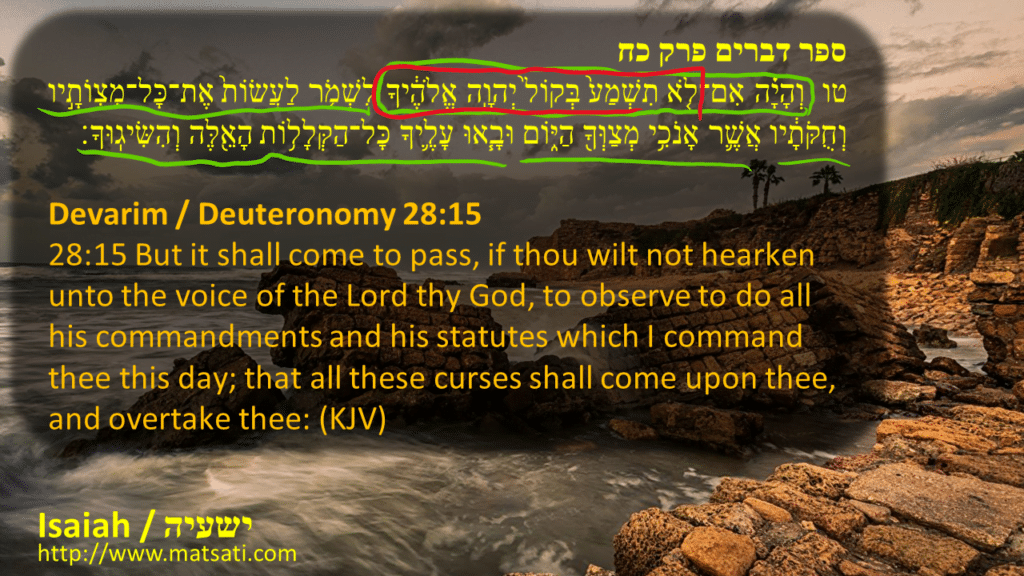
ספר דברים פרק כח
טו וְהָיָ֗ה אִם־לֹ֤א תִשְׁמַע֙ בְּקוֹל֙ יְהוָ֣ה אֱלֹהֶ֔יךָ לִשְׁמֹ֤ר לַעֲשׂוֹת֙ אֶת־כָּל־מִצְוֺתָ֣יו וְחֻקֹּתָ֔יו אֲשֶׁ֛ר אָנֹכִ֥י מְצַוְּךָ֖ הַיּ֑וֹם וּבָ֧אוּ עָלֶ֛יךָ כָּל־הַקְּלָל֥וֹת הָאֵ֖לֶּה וְהִשִּׂיגֽוּךָ׃
Devarim / Deuteronomy 28:15
28:15 But it shall come to pass, if thou wilt not hearken unto the voice of the Lord thy God, to observe to do all his commandments and his statutes which I command thee this day; that all these curses shall come upon thee, and overtake thee: (KJV)
The description provided us according to Isaiah עַל-כֵּן כָּל-יָדַיִם תִּרְפֶּינָה וְכָל-לְבַב אֱנוֹשׁ יִמָּס “Therefore shall all hands be faint, and every man’s heart shall melt” is exactly what happens to those who לֹ֤א תִשְׁמַע֙ בְּקוֹל֙ Hashem (do not listen to the voice of the Lord). The point is that those who choose to not listen, this is what Isaiah has been talking about all of these chapters, the people’s lack of trust in the Lord has led to their current predicament. These Torah based truths remain valid for us today if we are unwilling to listen to the voice of God. Here Isaiah describes how the men will become weak saying וְנִבְהָלוּ | צִירִים וַחֲבָלִים יֹאחֵזוּן “And they shall be afraid: pangs and sorrows shall take hold of them” and they will flee their enemies. This is the outcome of turning one’s back on the Lord. On the other hand, the blessing of God comes to those who listen to the voice of God and obey. These things are true even today!
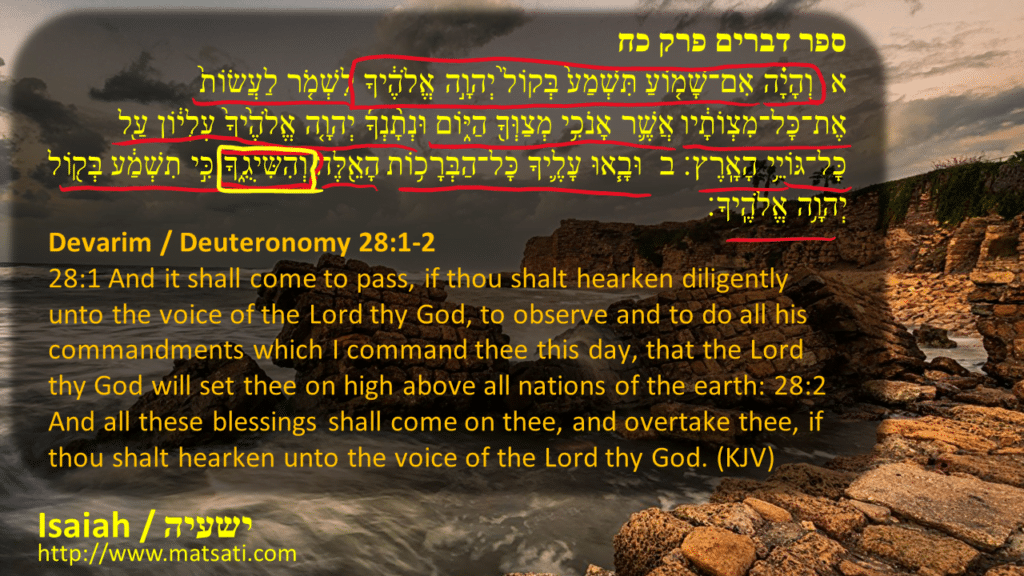
ספר דברים פרק כח
א וְהָיָ֗ה אִם־שָׁמ֤וֹעַ תִּשְׁמַע֙ בְּקוֹל֙ יְהוָ֣ה אֱלֹהֶ֔יךָ לִשְׁמֹ֤ר לַעֲשׂוֹת֙ אֶת־כָּל־מִצְוֺתָ֔יו אֲשֶׁ֛ר אָנֹכִ֥י מְצַוְּךָ֖ הַיּ֑וֹם וּנְתָ֨נְךָ֜ יְהוָ֤ה אֱלֹהֶ֙יךָ֙ עֶלְי֔וֹן עַ֖ל כָּל־גּוֹיֵ֥י הָאָֽרֶץ׃ ב וּבָ֧אוּ עָלֶ֛יךָ כָּל־הַבְּרָכ֥וֹת הָאֵ֖לֶּה וְהִשִּׂיגֻ֑ךָ כִּ֣י תִשְׁמַ֔ע בְּק֖וֹל יְהוָ֥ה אֱלֹהֶֽיךָ׃
Devarim / Deuteronomy 28:1-2
28:1 And it shall come to pass, if thou shalt hearken diligently unto the voice of the Lord thy God, to observe and to do all his commandments which I command thee this day, that the Lord thy God will set thee on high above all nations of the earth: 28:2 And all these blessings shall come on thee, and overtake thee, if thou shalt hearken unto the voice of the Lord thy God. (KJV)
Note that what the Lord is doing here is fulfilling His word according to the Torah. When man turns his back upon the Lord, all of the pride and haughtiness will be brought low. The people will be given a fear that will cause them to tremble, their weapons will fail, and they will not be able to resist their enemies. Remember according to 1 Corinthians 10, Paul wrote that these things were all written for our instruction. Therefore, all of these things should cause us to pause and ask ourselves, “in whom do I trust?” Do I trust in myself, or do I trust in the Lord? The answer should be “I trust in the Lord to defend me.” This is the very thing that takes place by our faith in Yeshua the Messiah. We are clothed in the righteousness of God when we stand before His throne!
ספר ישעיה פרק יג
ט הִנֵּה יוֹם-יְהֹוָה בָּא אַכְזָרִי וְעֶבְרָה וַחֲרוֹן אָף לָשֹוּם הָאָרֶץ לְשַׁמָּה וְחַטָּאֶיהָ יַשְׁמִיד מִמֶּנָּה:
Isaiah 13:9 states, “Behold, the day of the LORD cometh, (הִנֵּה יוֹם-יְהֹוָה בָּא) cruel both with wrath and fierce anger, to lay the land desolate: (אַכְזָרִי וְעֶבְרָה וַחֲרוֹן אָף לָשֹוּם הָאָרֶץ) and he shall destroy the sinners thereof out of it. (לְשַׁמָּה וְחַטָּאֶיהָ יַשְׁמִיד מִמֶּנָּה)” Here the Lord is using a foreign nation to bring judgment to Israel. Isaiah is teaching us that when a person chooses to do things on his own, independent of the Lord, disaster is at hand. To sin is to miss the mark or goal that the Lord God wants for us.
ספר ישעיה פרק יג
י כִּי-כוֹכְבֵי הַשָּׁמַיִם וּכְסִילֵיהֶם לֹא יָהֵלּוּ אוֹרָם חָשַׁךְ הַשֶּׁמֶשׁ בְּצֵאתוֹ וְיָרֵחַ לֹא-יַגִּיהַ אוֹרוֹ: יא וּפָקַדְתִּי עַל-תֵּבֵל רָעָה וְעַל-רְשָׁעִים עֲוֹנָם וְהִשְׁבַּתִּי גְּאוֹן זֵדִים וְגַאֲוַת עָרִיצִים אַשְׁפִּיל
Isaiah 13:10 states, “For the stars of heaven and the constellations thereof shall not give their light: (כִּי-כוֹכְבֵי הַשָּׁמַיִם וּכְסִילֵיהֶם לֹא יָהֵלּוּ אוֹרָם) the sun shall be darkened in his going forth, and the moon shall not cause her light to shine. (חָשַׁךְ הַשֶּׁמֶשׁ בְּצֵאתוֹ וְיָרֵחַ לֹא-יַגִּיהַ אוֹרוֹ)” Isaiah 13:11 “And I will punish the world for their evil, and the wicked for their iniquity; (וּפָקַדְתִּי עַל-תֵּבֵל רָעָה וְעַל-רְשָׁעִים עֲוֹנָם) and I will cause the arrogance of the proud to cease, and will lay low the haughtiness of the terrible. (וְהִשְׁבַּתִּי גְּאוֹן זֵדִים וְגַאֲוַת עָרִיצִים אַשְׁפִּיל)” Something to note that the nation’s worship the stars in heaven. This idea of the stars of heaven ceasing to show their light may be a way of saying how the Lord was defeating their gods in whom they trust. These things describe how the day of the Lord will be darkness and there will be no other gods. The heavenly bodies which simply reflect the glory of God who are worshiped will cease, and these nations which are already in darkness due to their sins, will be plunged into utter darkness. Note how evil always needs darkness to hide their sins. (John 3:19-20) Sinners love the darkness and commit their sins in the dark. Remember that God is light (Tehillim / Psalms 139:11-12, 1 John 1:5) and sin does not like the light. (Light = Righteousness) The nations such as the Greeks made their gods in their image, in the image of man, which is due to their pride. Pride is setting oneself up in a position of glory in one’s heart. It is in this behavior that leads to one taking advantage of others which is in defiance of the Lord God’s plan for our lives. Sin always leads to more sin and sewing to the flesh one reaps from the flesh. This is a fundamental concept laid out in both the Torah and the NT text. This truth is what we read according to Vayikra / Leviticus 26:17, “I will set my face against you, and you shall be struck down before your enemies. Those who hate you shall rule over you, and you shall flee when none pursues you.” (ESV, וְנָתַתִּ֤י פָנַי֙ בָּכֶ֔ם וְנִגַּפְתֶּ֖ם לִפְנֵ֣י אֹיְבֵיכֶ֑ם וְרָד֤וּ בָכֶם֙ שֹֽׂנְאֵיכֶ֔ם וְנַסְתֶּ֖ם וְאֵין־רֹדֵ֥ף אֶתְכֶֽם׃) Devarim / Deuteronomy 28:25 The LORD will cause you to be defeated before your enemies. You will come at them from one direction but flee from them in seven, and you will become a thing of horror to all the kingdoms on earth. (NIV, יִתֶּנְךָ֨ יְהוָ֥ה׀ נִגָּף֮ לִפְנֵ֣י אֹיְבֶיךָ֒ בְּדֶ֤רֶךְ אֶחָד֙ תֵּצֵ֣א אֵלָ֔יו וּבְשִׁבְעָ֥ה דְרָכִ֖ים תָּנ֣וּס לְפָנָ֑יו וְהָיִ֣יתָ לְזַעֲוָ֔ה לְכֹ֖ל מַמְלְכ֥וֹת הָאָֽרֶץ) all because the people turned their backs upon the Lord and refused to listen to His voice! Teshuvah (Repentance) means to turn, to be awakened from the slumbering soul. Maimonides writes saying, “There is a hidden message we are supposed to infer by listening to the shofar. It suggests to say: ‘sleeping ones, AWAKE from your sleep! Slumbering ones, AWAKE from your slumber! Examine your deeds and remember your Creator and perform Teshuvah!” This similar statement is made by Paul in the book of Ephesians according to Ephesians 5:13-14, “But everything exposed by the light becomes visible-and everything that is illuminated becomes a light. This is why it is said: “Wake up, sleeper, rise from the dead, and Christ will shine on you.” Notice this idea of the Messiah shining upon His people, this is the righteousness of God that is given to the Messiah through whom we are atoned, delivered, and redeemed. Note the light and dark theme here, and the call to awaken from sleep. The Lord God is calling us just as He is calling the people in Isaiah’s time to repent, to return to the ways of the Lord, to seek His face, and to find joy in His salvation, rest, and peace.
Note that these concepts from Isaiah 13:10 are mentioned in Matthew 24:29 and Mark 13:24
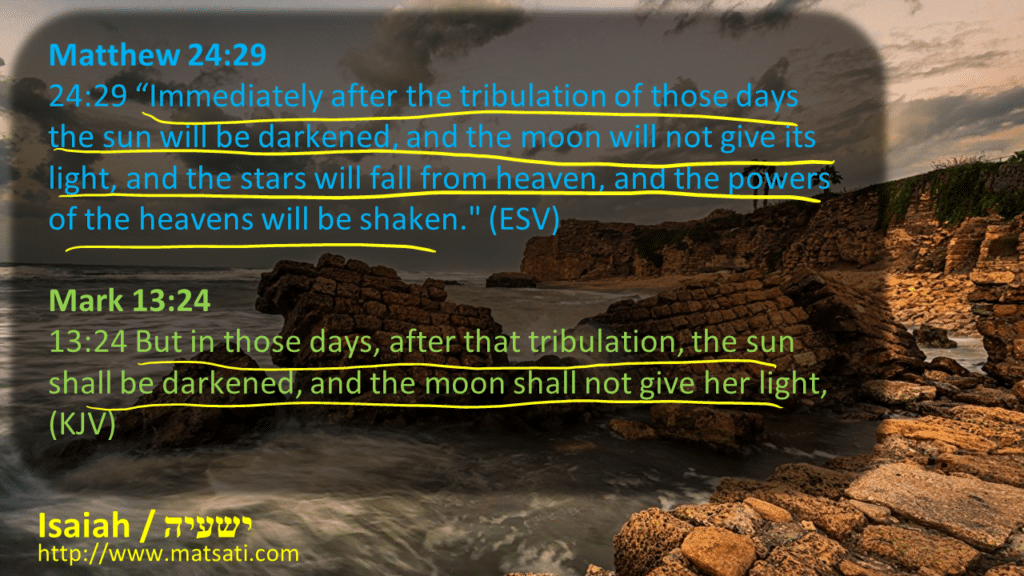
Matthew 24:29
24:29 “Immediately after the tribulation of those days the sun will be darkened, and the moon will not give its light, and the stars will fall from heaven, and the powers of the heavens will be shaken.” (ESV)
Mark 13:24
13:24 But in those days, after that tribulation, the sun shall be darkened, and the moon shall not give her light, (KJV)
We note the context, following this event (the sun, moon, and stars going dark) will be the return of the Messiah at the right hand of the Power (Father God), and the reason being these are worshiped, and to be consistent with there being no gods before our God! All of these things speak to the great and mighty day of the Lord. Isaiah, Matthew, and Mark, in each of these books we note how the presence of God causes the lesser lights to become extinguished. This again causes us to come to the same conclusion, that all pride and everything that sets itself up against the Lord will be humbled and brought low on that great day. Revelation describes this as both heaven and earth fled from God’s presence. (Revelation 20:11) The point is that we are being called to seek the face of God, to humble ourselves and listen to the voice of the Holy One of Israel!
Rabbinic Literature on Isaiah 13:1-11
The Targum Jonathan is a rabbinic interpretation of the book of Isaiah. Occasionally Jonathan provides us with additional thoughts on the text of Isaiah from a Jewish perspective and thus causing the Targum to become an important text for us to study.
תרגום יונתן בן עוזיאל אל ישעיה פרק יג:א-יא
א מַטַל כָס דִלוָט לְאַשקָאָה יָת בָבַל דְאִתנַבִי יְשַעיָה בַר אָמֹוץ׃ ב עַל כַרכָא יָתֵיב שְלֵיוָא זְקוּפוּ אָתָא אְרִימוּ קָלָא לְהֹון אְנִיפוּ יַד וְיֵיעְלוּן בְתַרעֹוהִי מְנַדְבִין׃ ג אְנָא פַקֵידִית לִמזָמְנָי אַף עָרְעִית גִיבָרַי וְיִתפַרעוּן מִנְהֹון רוּגזִי תַקִיפֵי תוּשבַחתִי׃ ד קָל הְמֹון בְטוּרַיָא דְמוּת עַם סַגִי קָל אִתרְגֹושַת מַלכְווָן עַמְמִין דְמִתכַנשִין יוי צְבַאֹות מְמַנֵי מַשרְיָן בִקרָבָא׃ ה אָתַן מֵאְרַע רַחִיקָא מִסְיָפֵי שְמַיָא יוי וּמַנִי כָס דִלוָט קֳדָמֹוהִי לְחַבָלָא כָל רַשִיעֵי אַרעָא׃ ו אֵילִילוּ אְרֵי קָרִיב יֹומָא דַעְתִיד לְמֵיתֵי מִן קֳדָם יוי כְבִיזָא מִן קֳדָם שַדַי יֵיתֵי׃ ז עַל כֵין כָל יְדַיָא יִתרַשְלָן וְכָל לִיבָא דַאְנָשָא יִתמְסֵי׃ ח וְיִתבַהלוּן עָקָא וְחִבלִין ייֵחְדוּנוּנוּן זְיָע כְיָלֵידתָא יְזוּעוּן גְבַר בְחַברֵיה יִתמְהֹון אַפֵי שַלהֹובִין אַפֵיהֹון׃ ט הָא יֹומָא מִן קְ יוי אָתֵי אַכְזַרי וְתַעְבוּר וּתקֹוף רְגַז לְשַוָאָה אַרעָא לְצָדוּ וְחַיָיבַהָא יְשֵיצֵי מִינַה׃ י אְרֵי כֹוכְבֵי שְמַיָא וּנפִילֵיהֹון לָא יַזהְרוּן נֵיהֹורְהֹון יִקבַל שִמשָא בְמִיפְקֵיה וְסֵיהְרָא לָא יַזהַר נֵיהֹורֵיה׃ יא וְאַסעַר עַל דְדָיְרִין בְתֵבֵל בִישָא וְעַל רַשִיעַיָא חֹובֵיהֹון וַאְבַטֵיל רְבוּת רַשִיעִין וּתקֹוף תַקִיפֵיהֹון אַמאֵיך׃
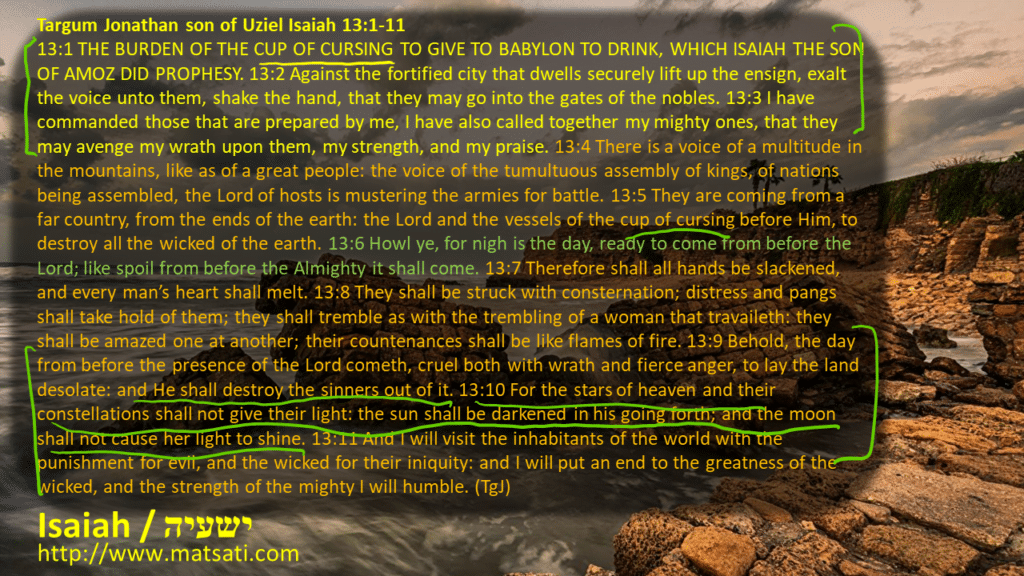
Targum Jonathan son of Uziel Isaiah 13:1-11
13:1 THE BURDEN OF THE CUP OF CURSING TO GIVE TO BABYLON TO DRINK, WHICH ISAIAH THE SON OF AMOZ DID PROPHESY. 13:2 Against the fortified city that dwells securely lift up the ensign, exalt the voice unto them, shake the hand, that they may go into the gates of the nobles. 13:3 I have commanded those that are prepared by me, I have also called together my mighty ones, that they may avenge my wrath upon them, my strength, and my praise. 13:4 There is a voice of a multitude in the mountains, like as of a great people: the voice of the tumultuous assembly of kings, of nations being assembled, the Lord of hosts is mustering the armies for battle. 13:5 They are coming from a far country, from the ends of the earth: the Lord and the vessels of the cup of cursing before Him, to destroy all the wicked of the earth. 13:6 Howl ye, for nigh is the day, ready to come from before the Lord; like spoil from before the Almighty it shall come. 13:7 Therefore shall all hands be slackened, and every man’s heart shall melt. 13:8 They shall be struck with consternation; distress and pangs shall take hold of them; they shall tremble as with the trembling of a woman that travaileth: they shall be amazed one at another; their countenances shall be like flames of fire. 13:9 Behold, the day from before the presence of the Lord cometh, cruel both with wrath and fierce anger, to lay the land desolate: and He shall destroy the sinners out of it. 13:10 For the stars of heaven and their constellations shall not give their light: the sun shall be darkened in his going forth; and the moon shall not cause her light to shine. 13:11 And I will visit the inhabitants of the world with the punishment for evil, and the wicked for their iniquity: and I will put an end to the greatness of the wicked, and the strength of the mighty I will humble. (TgJ)
It is interesting when studying the Scriptures, on the covenants, and particularly on Pesach (Passover) in the New Covenant in Yeshua the Messiah, we understand how the cups are “references to” or “representative of” the blood of the Covenant and the forgiveness of sins and this is directly related to those who participate in the memorial. The memorial is the remembering of the promises of God, of His great power to deliver us, and of the promises in the Messiah Yeshua that we can trust our Father in heaven to save us from this world and that He offers peace, life everlasting, mercy and grace to receive the forgiveness of sins. Pesach and the cups, the covenants, the promises of God, this subject is so broad and so vast, one could write volumes on this topic, from the Tanakh and Apostolic writings, and all of the connections made according to the Rabbinic literature, etc. What is interesting is how the Scriptures describe the covenant of God in the cups of blessing and consider what we read here in Isaiah, according to the TgJ, there is a counterpart to the blessing, known as the cup of cursing. We read this according to Isaiah 13:1-3, א מַטַל כָס דִלוָט לְאַשקָאָה יָת בָבַל דְאִתנַבִי יְשַעיָה בַר אָמֹוץ׃ 13:1 THE BURDEN OF THE CUP OF CURSING TO GIVE TO BABYLON TO DRINK, WHICH ISAIAH THE SON OF AMOZ DID PROPHESY. ב עַל כַרכָא יָתֵיב שְלֵיוָא זְקוּפוּ אָתָא אְרִימוּ קָלָא לְהֹון אְנִיפוּ יַד וְיֵיעְלוּן בְתַרעֹוהִי מְנַדְבִין׃ 13:2 Against the fortified city that dwells securely lift up the ensign, exalt the voice unto them, shake the hand, that they may go into the gates of the nobles. ג אְנָא פַקֵידִית לִמזָמְנָי אַף עָרְעִית גִיבָרַי וְיִתפַרעוּן מִנְהֹון רוּגזִי תַקִיפֵי תוּשבַחתִי׃ 13:3 I have commanded those that are prepared by me, I have also called together my mighty ones, that they may avenge my wrath upon them, my strength, and my praise. (TgJ) Here Isaiah speaks of the cup of cursing that is given to Babylon to drink. This leads to the destruction of not just Judah and Jerusalem, but to Babylon as well. We note also that Isaiah speaks saying, ג אֲנִי צִוֵּיתִי לִמְקֻדָּשָׁי גַּם קָרָאתִי גִבּוֹרַי לְאַפִּי עַלִּיזֵי גַּאֲוָתִי: “I have commanded my sanctified ones, I have also called my mighty ones for mine anger, even them that rejoice in my highness.” TgJ translates Isaiah אֲנִי צִוֵּיתִי לִמְקֻדָּשָׁי “I commanded my holy ones / sanctified ones” as אְנָא פַקֵידִית “I have appointed” indicating that “I have commanded those that are prepared by me.” The idea of לִמְקֻדָּשָׁי my sanctified one, is synonymous to one being prepared for such a time. The idea here is these nations were created for destruction, for desolation, for causing pain and suffering on earth, and then to be consigned unto hell in the afterlife. Notice how there is a counterpart to the holy and sanctified people (God’s people) as opposed to the sanctified ones, the גִיבָרַי mighty ones who receive the cup of cursing, is prepared for this time and event to bring judgment upon the people for their sins. This is similar to what Paul wrote according to Romans 9:22. It is interesting that the dead sea scrolls (DSS) comment upon the cup that is at the right hand of God representing a position of power.
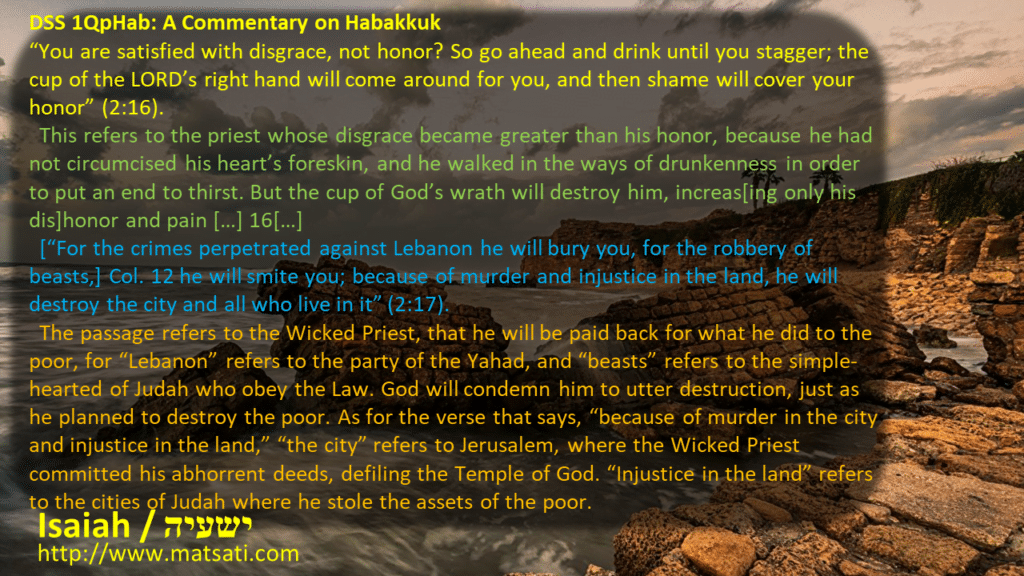
DSS 1QpHab: A Commentary on Habakkuk
“You are satisfied with disgrace, not honor? So go ahead and drink until you stagger; the cup of the LORD’s right hand will come around for you, and then shame will cover your honor” (2:16).
This refers to the priest whose disgrace became greater than his honor, because he had not circumcised his heart’s foreskin, and he walked in the ways of drunkenness in order to put an end to thirst. But the cup of God’s wrath will destroy him, increas[ing only his dis]honor and pain […] 16[…]
[“For the crimes perpetrated against Lebanon he will bury you, for the robbery of beasts,] Col. 12 he will smite you; because of murder and injustice in the land, he will destroy the city and all who live in it” (2:17).
The passage refers to the Wicked Priest, that he will be paid back for what he did to the poor, for “Lebanon” refers to the party of the Yahad, and “beasts” refers to the simple-hearted of Judah who obey the Law. God will condemn him to utter destruction, just as he planned to destroy the poor. As for the verse that says, “because of murder in the city and injustice in the land,” “the city” refers to Jerusalem, where the Wicked Priest committed his abhorrent deeds, defiling the Temple of God. “Injustice in the land” refers to the cities of Judah where he stole the assets of the poor.
The DSS speaks to the wicked one who receives the cup of God’s wrath due to his sins of murder, injustice, and pride. These things are consistent with what we are reading concerning Isaiah and the TgJ. The Talmud Bavli and Rashi state the following concerning these verses.
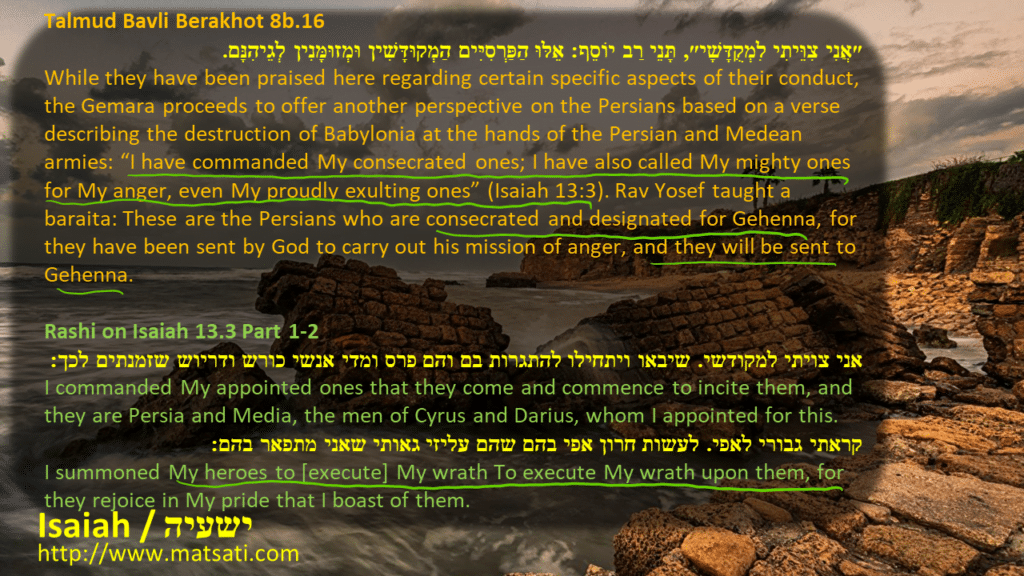
Talmud Bavli Berakhot 8b.16
״אֲנִי צִוֵּיתִי לִמְקֻדָּשָׁי״, תָּנֵי רַב יוֹסֵף: אֵלּוּ הַפַּרְסִיִּים הַמְקוּדָּשִׁין וּמְזוּמָּנִין לְגֵיהִנָּם.
While they have been praised here regarding certain specific aspects of their conduct, the Gemara proceeds to offer another perspective on the Persians based on a verse describing the destruction of Babylonia at the hands of the Persian and Medean armies: “I have commanded My consecrated ones; I have also called My mighty ones for My anger, even My proudly exulting ones” (Isaiah 13:3). Rav Yosef taught a baraita: These are the Persians who are consecrated and designated for Gehenna, for they have been sent by God to carry out his mission of anger, and they will be sent to Gehenna.
Rashi on Isaiah 13.3 Part 1-2
אני צויתי למקודשי. שיבאו ויתחילו להתגרות בם והם פרס ומדי אנשי כורש ודריוש שזמנתים לכך:
I commanded My appointed ones that they come and commence to incite them, and they are Persia and Media, the men of Cyrus and Darius, whom I appointed for this.
קראתי גבורי לאפי. לעשות חרון אפי בהם שהם עליזי גאותי שאני מתפאר בהם:
I summoned My heroes to [execute] My wrath To execute My wrath upon them, for they rejoice in My pride that I boast of them.
The rabbis in the Talmud speak to those who are called to destroy Judah and Jerusalem, that they are consecrated by God to do this task and are designated for Gehenna (Hell). Rashi goes on to say that these mighty men of war were created for the purpose of executing God’s wrath upon the people who would not repent of their sins and to bring down pride destroying the thing that they place their trust in man and not in God. Remember the Torah example that Paul draws out according to Romans 9:17-18 saying, “‘For this very purpose I raised you up, to demonstrate My power in you, and that My name might be proclaimed throughout the whole earth.’ So then He has mercy on whom He desires, and He hardens whom He desires.” The example given to us from the Torah was that Pharaoh would harden his heart, and that God would also harden his heart for the purpose of demonstrating His great might and power in the earth. (Shemot / Exodus 4:21) This power of God is so great that He is able to work even in the hearts of men, this is demonstrated not just in the Pharaoh, but also in the mighty men being described here in Isaiah 13:1-3. It was God’s intention to bring His wrath upon the Egyptians, and similarly to the unrepentant of Israel. We note what the Pharaoh said, “Who is the LORD that I should obey His voice to let Israel go?” (Shemot / Exodus 5:1-2) This suggests to us that Pharaoh’s heart wasn’t soft, he was already hardened. His own religion considered the Pharaoh as a god, and so He was filled with pride and the might of Egypt, just as the people of Judah and Jerusalem were filled with pride in their security that they trust in Assyria and men. The result of Moshe going to Pharaoh asking for him to let the people go, Pharaoh increased the people’s workload and then Moshe complained to the Lord according to Shemot / Exodus 5:22. The point of this was that the increased workload was not God’s fault but was a function of the “free will” of Pharaoh, his hardness of heart, to increase their troubles. These things provide the background for what is taking place here according to the TgJ, and for what Paul was saying according to Romans 9. The point that we are learning here is how pride stands in opposition to God’s truth, which is to be humble and seek the Lord. The Pharaoh was created by God, he was a man who was formed and made for this specific purpose, to serve in God’s ultimate plan within the confines of his (Pharaoh’s) own freedom to choose to do what he wants. Regardless of his sinfulness or his level of pagan worship, he was a servant of God in heaven in his own capacity, for the destruction and desolation of his kingdom by God in heaven at the hand of God’s servant Moshe. Pharaoh acted on the desires of his wicked heart, and God used these things to bring to completion His plan for both the nation of Egypt and the Nation of Israel. So, we are brought to the question about why there are vessels, or people, prepared for destruction? The reason is because of the love of God being demonstrated on behalf of His people. It is in this way that we learn about who God is and of His great mercies and grace to save and deliver His people no matter what the circumstance. We recognize that without destruction and injustice, there is no demonstration of mercy and grace. These vessels of wrath that Isaiah says are God’s sanctified ones, they would never choose to do anything else besides walking in the flesh, in the desires of their heart, and they detest the vessels that receive the mercy of God. This is how Paul understood there are vessels that are prepared for destruction, and so there are those who are prepared for destruction and there are those who are prepared for His mercies as well. (Note this does not support the false doctrine of Calvinism!)
Isaiah continues saying according to the TgJ, ד קָל הְמֹון בְטוּרַיָא דְמוּת עַם סַגִי קָל אִתרְגֹושַת מַלכְווָן עַמְמִין דְמִתכַנשִין יוי צְבַאֹות מְמַנֵי מַשרְיָן בִקרָבָא׃ 13:4 There is a voice of a multitude in the mountains, like as of a great people: the voice of the tumultuous assembly of kings, of nations being assembled, the Lord of hosts is mustering the armies for battle. ה אָתַן מֵאְרַע רַחִיקָא מִסְיָפֵי שְמַיָא יוי וּמַנִי כָס דִלוָט קֳדָמֹוהִי לְחַבָלָא כָל רַשִיעֵי אַרעָא׃ 13:5 They are coming from a far country, from the ends of the earth: the Lord and the vessels of the cup of cursing before Him, to destroy all the wicked of the earth. (TgJ) The Targum interprets Isaiah as the nation that is being used for destruction, is coming from the farthest reaches of the earth, a great distance, for the purpose of carrying out God’s Wrath. The Midrash Tanchuma, Tazria 9.1 has the following to say concerning these verses.
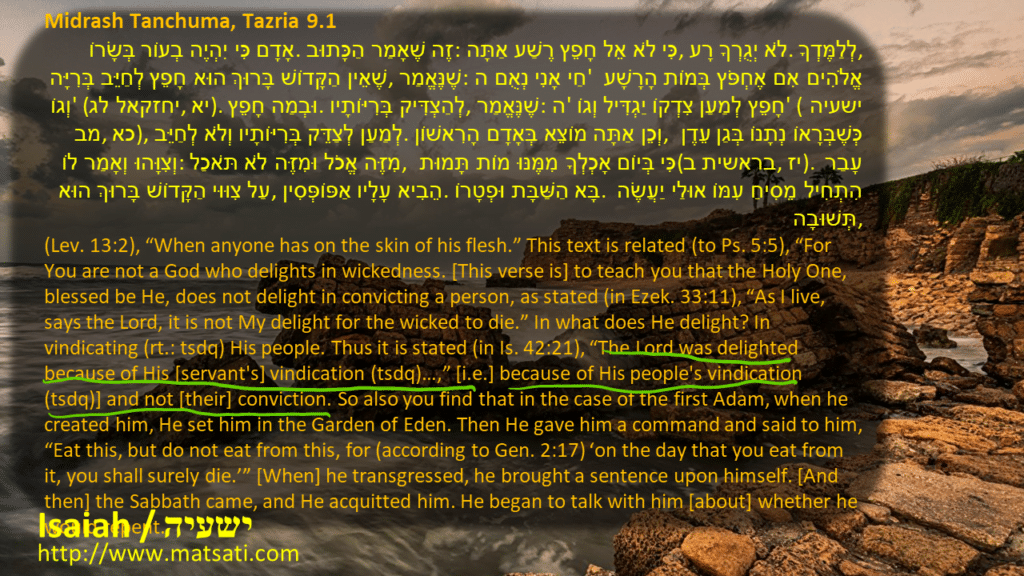
Midrash Tanchuma, Tazria 9.1
אָדָם כִּי יִהְיֶה בְעוֹר בְּשָׂרוֹ. זֶה שֶׁאָמַר הַכָּתוּב: כִּי לֹא אֵל חָפֵץ רֶשַׁע אַתָּה, לֹא יְגֻרְךָ רָע. לְלַמֶּדְךָ, שֶׁאֵין הַקָּדוֹשׁ בָּרוּךְ הוּא חָפֵץ לְחַיֵּב בְּרִיָּה, שֶׁנֶּאֱמַר: חַי אָנִי נְאֻם ה’ אֱלֹהִים אִם אֶחְפֹּץ בְּמוֹת הָרָשָׁע וְגוֹ’ (יחזקאל לג, יא). וּבְמַה חָפֵץ. לְהַצְדִּיק בְּרִיּוֹתָיו, שֶׁנֶּאֱמַר: ה’ חָפֵץ לְמַעַן צִדְקוֹ יַגְדִּיל וְגוֹ’ (ישעיה מב, כא), לְמַעַן לְצַדֵּק בְּרִיּוֹתָיו וְלֹא לְחַיֵּב. וְכֵן אַתָּה מוֹצֵא בְּאָדָם הָרִאשׁוֹן, כְּשֶׁבְּרָאוֹ נְתָנוֹ בְּגַן עֵדֶן וְצִוָּהוּ וְאָמַר לוֹ: מִזֶּה אֱכֹל וּמִזֶּה לֹא תֹּאכַל, כִּי בְּיוֹם אָכְלְךָ מִמֶּנּוּ מוֹת תָּמוּת (בראשית ב, יז). עָבַר עַל צִוּוּי הַקָּדוֹשׁ בָּרוּךְ הוּא, הֵבִיא עָלָיו אַפּוֹפְּסִין. בָּא הַשַּׁבָּת וּפְטָרוֹ. הִתְחִיל מֵסִיחַ עִמּוֹ אוּלַי יַעֲשֶׂה תְּשׁוּבָה,
(Lev. 13:2), “When anyone has on the skin of his flesh.” This text is related (to Ps. 5:5), “For You are not a God who delights in wickedness. [This verse is] to teach you that the Holy One, blessed be He, does not delight in convicting a person, as stated (in Ezek. 33:11), “As I live, says the Lord, it is not My delight for the wicked to die.” In what does He delight? In vindicating (rt.: tsdq) His people. Thus it is stated (in Is. 42:21), “The Lord was delighted because of His [servant’s] vindication (tsdq)…,” [i.e.] because of His people’s vindication (tsdq)] and not [their] conviction. So also you find that in the case of the first Adam, when he created him, He set him in the Garden of Eden. Then He gave him a command and said to him, “Eat this, but do not eat from this, for (according to Gen. 2:17) ‘on the day that you eat from it, you shall surely die.’” [When] he transgressed, he brought a sentence upon himself. [And then] the Sabbath came, and He acquitted him. He began to talk with him [about] whether he would repent.
The Chazal point out that even though there is a nation that is as Isaiah states אֲנִי צִוֵּיתִי לִמְקֻדָּשָׁי “I commanded my holy ones / sanctified ones” who have been פַקֵידִית “appointed” to do this task, the Lord God does not delight in the death of the wicked. The reason this is true is because the NT text states according to 1 Timothy 2:3-4, 2:3 This is good and pleasing in the sight of God our Savior, 2:4 who wants everyone to be saved and to come to the knowledge of the truth. (BSB) Paul writes interpretively in Ezekiel 33:11 that the Lord does not delight in the wicked to die but that he would repent and turn from his sins. The delight of the Lord is found in vindication / righteousness (ה’ חָפֵץ לְמַעַן צִדְקוֹ). The example is given from the Torah regarding the mercies of God and Adam in the Garden of Eden. The Lord God brought a sacrifice to atone for Adam’s sin where he first talked to him to see whether he would repent. Repentance is a necessary factor. In the Midrash, R. Johanan said, “If you do not pursue evil, evil will not pursue you, nor will it dwell with you. (Tehillim / Psalms 5:5)” This is a truth, since sin tends to cling itself to the one who practices it! The idea is that the coming to the knowledge of the truth, this is not simply a theoretical or psycho-emotional acceptance of God’s truth in the Scriptures. This is a practical applied truth, living one’s life according to God’s word by faith! This outcome of all being saved, is the will of God to provide this opportunity, however only some will accept the divine invitation seeking the God of Israel and His Messiah Yeshua. The Targum goes on quoting from Jeremiah 11:3 saying, “Thus says the Lord, the God of Israel, ‘Cursed is the one who does not heed the words of this covenant.’ In connection with one who puts his trust in flesh and blood, as stated (Jeremiah 17:5), Thus says the Lord, ‘Cursed is the man who trusts in a human being, who makes flesh his strength and whose heart turns from the Lord.’” The idea here is when one pursues evil, one is transgressing the covenant. In the case of the people of Judah and Jerusalem, they trusted in their agreement with man (The Assyrian army). This truth is not restricted to trusting in an army but also may be to that of anything relating to our mortality, our lives, and there are many modern-day examples. Those who are willing to humble their lives, seek the God in heaven, repent, and live according to His word are said to be marked where the Midrash continues saying the following: “Hence, this too was a great kindness. Now, the second [evil saying associated with the name of the Holy One, blessed be He] is (Ezek. 9:4:) ‘And the Lord said unto him, ‘Pass through the midst of the city, [through the midst of Jerusalem and mark (the letter) taw on the foreheads of those people who moan and groan over all the abominations] ….’’ The Holy One, blessed be He, said to Gabriel, ‘Go and write an ink taw upon the foreheads of the righteous, so that the angels of destruction will have no dominion over them. Then upon the foreheads of the wicked write a blood taw so that the angels of destruction will have dominion over them.’ [The] prosecution came in before the Holy One, blessed be He, [and said to him], ‘Master of the world, how do the former differ from the latter?’ He said to it, ‘The former are completely righteous, and the latter are completely wicked.’” There is a distinct parallel here in the rabbinic commentary to the Mark of the beast according to the book of Revelation in the NT. The point of these truths and their relation to the mark of the beast is in the command according to Devarim / Deuteronomy 11:18 (יח וְשַֹמְתֶּם אֶת-דְּבָרַי אֵלֶּה עַל-לְבַבְכֶם וְעַל-נַפְשְׁכֶם וּקְשַׁרְתֶּם אֹתָם לְאוֹת עַל-יֶדְכֶם וְהָיוּ לְטוֹטָפֹת בֵּין עֵינֵיכֶם:, 11:18 Therefore shall ye lay up these my words in your heart and in your soul, and bind them for a sign upon your hand, that they may be as frontlets between your eyes. KJV). Here we find the Shema and the significance of the command to bind the Word of God to the hand and to the forehead. We note that the Torah does not specify left or right hand, וְשַׂמְתֶּם֙ אֶת־דְּבָרַ֣י אֵ֔לֶּה עַל־לְבַבְכֶ֖ם וְעַֽל־נַפְשְׁכֶ֑ם וּקְשַׁרְתֶּ֨ם אֹתָ֤ם לְאוֹת֙ עַל־יֶדְכֶ֔ם וְהָי֥וּ לְטוֹטָפֹ֖ת בֵּ֥ין עֵינֵיכֶֽם׃ simply stating “your hand” and the Shulkhan Arukh also does not provide any specifics on left or right. It is interesting how coupled to the command on תפלין Tefillin is the idea of being sanctified by the commands of God. This putting on of God’s Word is symbolic of our trusting in the Lord and living our lives in such a way as to demonstrate that trust and love of God and His Holy Words! Note also that תפלין Tefillin is related to פלילה, meaning “testimony.” The idea here is that we are to be wrapped in God’s holy Word and bear the testimony of God to all the world. The one who takes upon himself the mark of the beast is said to take the mark on his right hand and his forehead. This means that the man wraps Tefillin on his left as opposed to his right side. There are significant theological consequences to this, that the left side represents sin, and hell according to Kabbalistic thought, and the right represents righteousness and truth (in the imagery of the tree of life, the sefirot). This taking of the mark is connected to a false system of worship taking place in the act of the binding of the mark to the right side and the forehead, those who receive the mark on their right hand and in their forehead. According to the rabbinic commentaries, all of these things are connected to a form of idolatry in one way or another.
Isaiah goes on according to the TgJ saying, ו אֵילִילוּ אְרֵי קָרִיב יֹומָא דַעְתִיד לְמֵיתֵי מִן קֳדָם יוי כְבִיזָא מִן קֳדָם שַדַי יֵיתֵי׃ 13:6 Howl ye, for nigh is the day, ready to come from before the Lord; like spoil from before the Almighty it shall come. (TgJ) The day of the Lord is filled with destruction for those who pursue evil. Salvation however is in the Lord for those who love righteousness. Pesikta Rabbati 41.1 states the following concerning this verse.
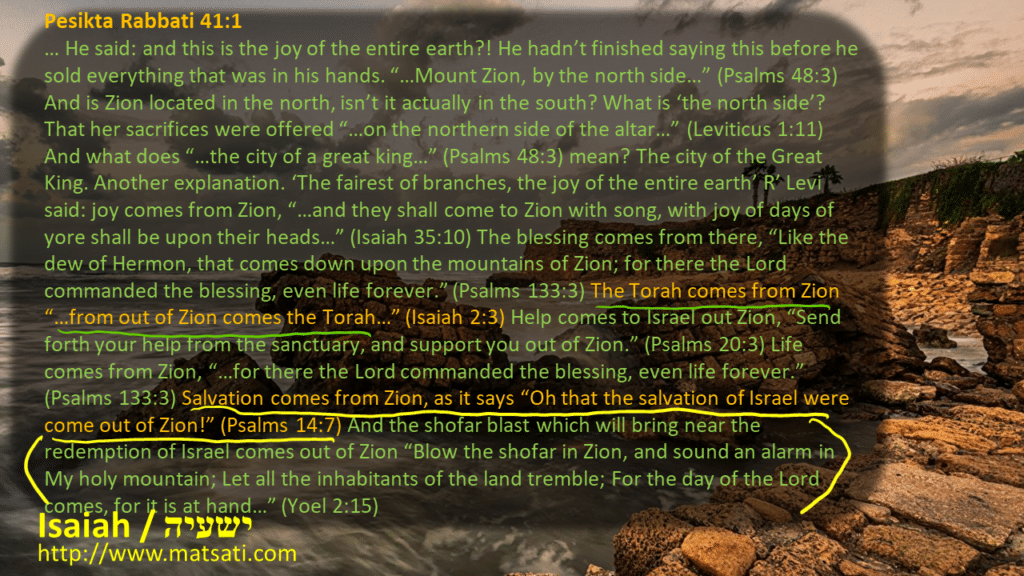
Pesikta Rabbati 41:1
… He said: and this is the joy of the entire earth?! He hadn’t finished saying this before he sold everything that was in his hands. “…Mount Zion, by the north side…” (Psalms 48:3) And is Zion located in the north, isn’t it actually in the south? What is ‘the north side’? That her sacrifices were offered “…on the northern side of the altar…” (Leviticus 1:11) And what does “…the city of a great king…” (Psalms 48:3) mean? The city of the Great King. Another explanation. ‘The fairest of branches, the joy of the entire earth’ R’ Levi said: joy comes from Zion, “…and they shall come to Zion with song, with joy of days of yore shall be upon their heads…” (Isaiah 35:10) The blessing comes from there, “Like the dew of Hermon, that comes down upon the mountains of Zion; for there the Lord commanded the blessing, even life forever.” (Psalms 133:3) The Torah comes from Zion “…from out of Zion comes the Torah…” (Isaiah 2:3) Help comes to Israel out Zion, “Send forth your help from the sanctuary, and support you out of Zion.” (Psalms 20:3) Life comes from Zion, “…for there the Lord commanded the blessing, even life forever.” (Psalms 133:3) Salvation comes from Zion, as it says “Oh that the salvation of Israel were come out of Zion!” (Psalms 14:7) And the shofar blast which will bring near the redemption of Israel comes out of Zion “Blow the shofar in Zion, and sound an alarm in My holy mountain; Let all the inhabitants of the land tremble; For the day of the Lord comes, for it is at hand…” (Yoel 2:15)
Note the things that are given to those who pursue righteousness. The Midrash Pesikta Rabbati describes the connection to life everlasting and the holy city of Jerusalem, the place in which the Torah goes forth through all the earth! The salvation of God is connected to the Torah of God, and this is the Gospel message, that the Lord God desires to dwell in our midst. Note how all of these things draw on the idea of the day of the Lord, the Messiah, the salvation of the nation, and the Torah. His Mashiach is connected to the great deliverance that only God is able to provide! For the wicked, the day of the Lord brings death and destruction, for the righteous the day of the Lord brings life everlasting! (Note all of the NT parallels to these things). Midrash Tanchuma on Bereshit 6.2 describes what is taken away from those who pursue evil by walking in sin.
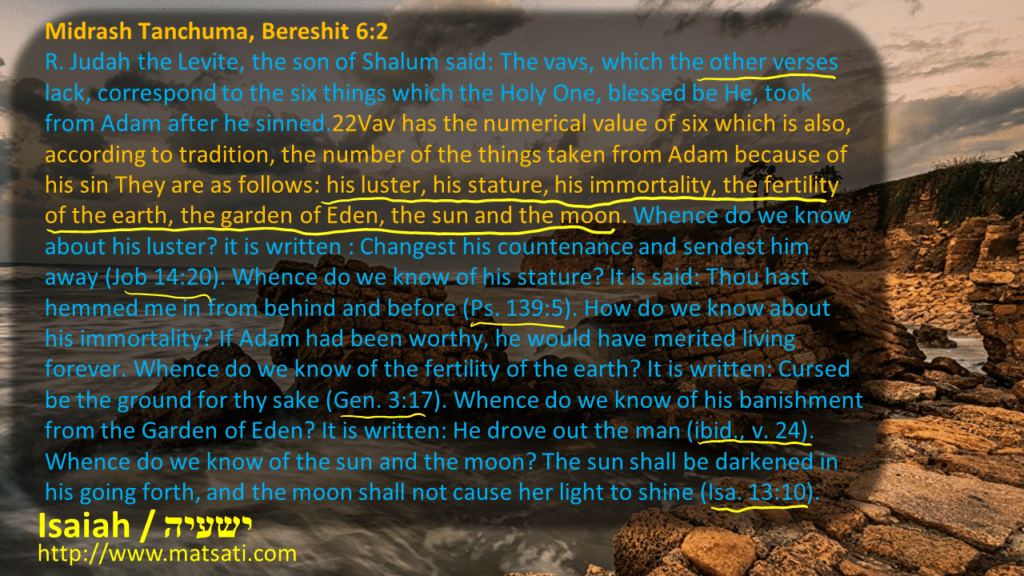
Midrash Tanchuma, Bereshit 6:2
R. Judah the Levite, the son of Shalum said: The vavs, which the other verses lack, correspond to the six things which the Holy One, blessed be He, took from Adam after he sinned.22Vav has the numerical value of six which is also, according to tradition, the number of the things taken from Adam because of his sin They are as follows: his luster, his stature, his immortality, the fertility of the earth, the garden of Eden, the sun and the moon. Whence do we know about his luster? it is written : Changest his countenance and sendest him away (Job 14:20). Whence do we know of his stature? It is said: Thou hast hemmed me in from behind and before (Ps. 139:5). How do we know about his immortality? If Adam had been worthy, he would have merited living forever. Whence do we know of the fertility of the earth? It is written: Cursed be the ground for thy sake (Gen. 3:17). Whence do we know of his banishment from the Garden of Eden? It is written: He drove out the man (ibid., v. 24). Whence do we know of the sun and the moon? The sun shall be darkened in his going forth, and the moon shall not cause her light to shine (Isa. 13:10).
The concepts being put forward here are to the consequences of pursuing a sinful life and living in unrepentance. The examples the rabbis provide is from the Torah, and Adam losing a number of things that were a part of his having lived his life for the Lord. One of those things was the gift of eternal life. Sin brought the curse, and likewise, sin breaks the covenant agreement that we have with the Lord God in heaven according to the Torah. Sin also has the characteristic of spreading, this is what the TgJ goes on to say יא וְאַסעַר עַל דְדָיְרִין בְתֵבֵל בִישָא וְעַל רַשִיעַיָא חֹובֵיהֹון וַאְבַטֵיל רְבוּת רַשִיעִין וּתקֹוף תַקִיפֵיהֹון אַמאֵיך׃ 13:11 And I will visit the inhabitants of the world with the punishment for evil, and the wicked for their iniquity: and I will put an end to the greatness of the wicked, and the strength of the mighty I will humble. (TgJ) The plan ultimately is Lord God Almighty will remove the wicked from their place bringing them low, forcing them to be humble before Him! Based upon all of these things we know that God loves us and offers to us eternal life if we are willing to give up trusting in ourselves and being trusting in Him for everything! This too is part of the Gospel Message, the Lord God will send His Messiah to save us from our sins, as we read according to the NT text. He is calling to all of us to believe in these things and to seek Him in all of our ways. The question is whether we are willing to do so or not? Our willingness or our unwillingness, will be what places us in one group versus the other! How willing are you to listen to the voice of God calling?
